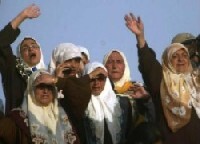
AP Photo/Charles Dharapak
British security officers with their CIA partners effectively took them hostage and forced them to a prison in Jericho.
History repeats itself. I cannot think about anything else. When I was in Nablus I was reading a special issue of the Journal of Palestine Studies on ‘The War in Lebanon’ which was published in the Summer/Fall of 1982. Reading through articles, eyewitness accounts, interviews, comments from the Arab and Israeli press, and documents and source material I came to the conclusion that the international perspective of this conflict has not changed.
For example, freelance writer Pamela Ann Smith wrote in her article ‘The European reaction to Israel’s invasion’:
‘Most of the European governments took several days to react. Although they condemned the invasion and called for firmer recognition of Palestinian rights, they stopped short of taking direct action themselves. Underneath the outrage there seemed to be a pervasive sense of powerlessness and feeling that little could be done until there is a dramatic change in US policy toward both the Israelis and the Palestinians.’
It is therefore not a surprise that Chris Patten, Commissioner for External Relations, warmly welcomed the statement from President Bush on April 5, 2002, in which he urged Israel to withdraw its troops and saying that ‘the United States is on record supporting the legitimate aspirations of the Palestinian people for a Palestinian state.’ However, yet again, both the United States and the European Union did not take any concrete action.
Pamela Ann Smith gives an overview of the response by the European press, European Jewry and European governments. Reading these pages, is reading history repeating itself. The Daily Express wrote on June 9, 1982: ‘The world has stood idly by while Israel has conquered southern Lebanon and besieged Beirut’, repeated by Le Monde on July 7, ‘No one has the right to remain silent.’ Michel Dubisson wrote on June 10 in Le Soir: ‘Imagine that under some pretext an Arab country had launched a ‘reprisal’ raid against Tel Aviv that a hundred Israeli civilians had lost their lives from the bombing.’
Also in 1982 there was a tight Israeli censorship. Le Monde, cited on July 8, the interrogation which a photographer of the Sygma Agency, Alain Keler, received two days earlier at Tel Aviv airport during which one of the Israeli policemen asked whether ‘you are first of all a Jew or a journalist,’ and then added forcibly, ‘understand this, we are conducting a war against journalists who are anti-Israeli.’ Other journalists, in both London and Paris, openly complained of the failure to allow reporters to visit the remains of the Palestinian refugee camps and to talk to Palestinian prisoners. Reading recent reports from the Committee to Protect Journalists and Reporters without Borders the similarities are striking. However, there seems to be a difference, the International Herald Tribune carried above items originating from Tel Aviv, Jerusalem or south Lebanon, the words: ‘This story was subject to Israeli censorship.’ It would not be a bad idea for a number of American media outlets to issue the same warning.
On June 13, 1982, the The Observer wrote that many in Europe ‘believe that the clumsiness of American policy is largely responsible for the present disastrous situation in the Middle East.’ Though it took some time, the member states of what is now called the European Union, produced a statement saying that Israel’s actions constitute ‘a flagrant violation of international law and of the most basic humanitarian principles. Furthermore, it compromises the efforts to achieve a peaceful settlement of the problems of the Middle East and creates the imminent danger of a generalized conflict’. Twenty years later, on May 3, 2002, the European Union stated at the Security Council on the Middle East:
‘Israel must fully comply with international humanitarian principles, including the UN conventions on the protection of civilians in times of war, and refrain from excessive use of force. Extra-judicial killings must stop. It must extend its fullest possible cooperation to humanitarian agencies and organizations, consistent with its obligations under international humanitarian law.
However, then and now, the European Union did not impose economic sanctions against Israel. Then and now, the European governments have avoided a break between Europe and the United States. Then and now, Britain rejected calls for an open declaration in support of economic sanctions but in 1982 it imposed a ban on arms sales to Israel, a move which received widespread support following reports that Israel supplied aircraft and missiles to Argentina during the Falklands war. Today, however, there is no sign that suggests that Britain will impose an arms embargo, eventhough British arms are being used by Israel in the occupied territories. Actually, today, Britain is complicit in Israel’s flagrant violations of international humanitarian law, including deportation and hostage taking.
Pamela Ann Smith concludes her article by stating that ‘while many in the past supported Israel, there seems to be a growing awareness that unless the Palestinians are allowed to create a state of their own the danger of a wider conflagration in the Middle East will continue to increase.’ Twenty years later Palestinians are still not practically allowed to create their state. History repeats itself. However it’s worse. We now have Europe actively aiding Israel to find the ‘final solution’ to the ‘problem’ of Palestine.
- the picture shows Palestinian woman wave and cry out from a rooftop as friends and family members among the 13 Palestinians to be deported emerge from the Church of the Nativity in Bethlehem (AP Photo/Charles Dharapak).



